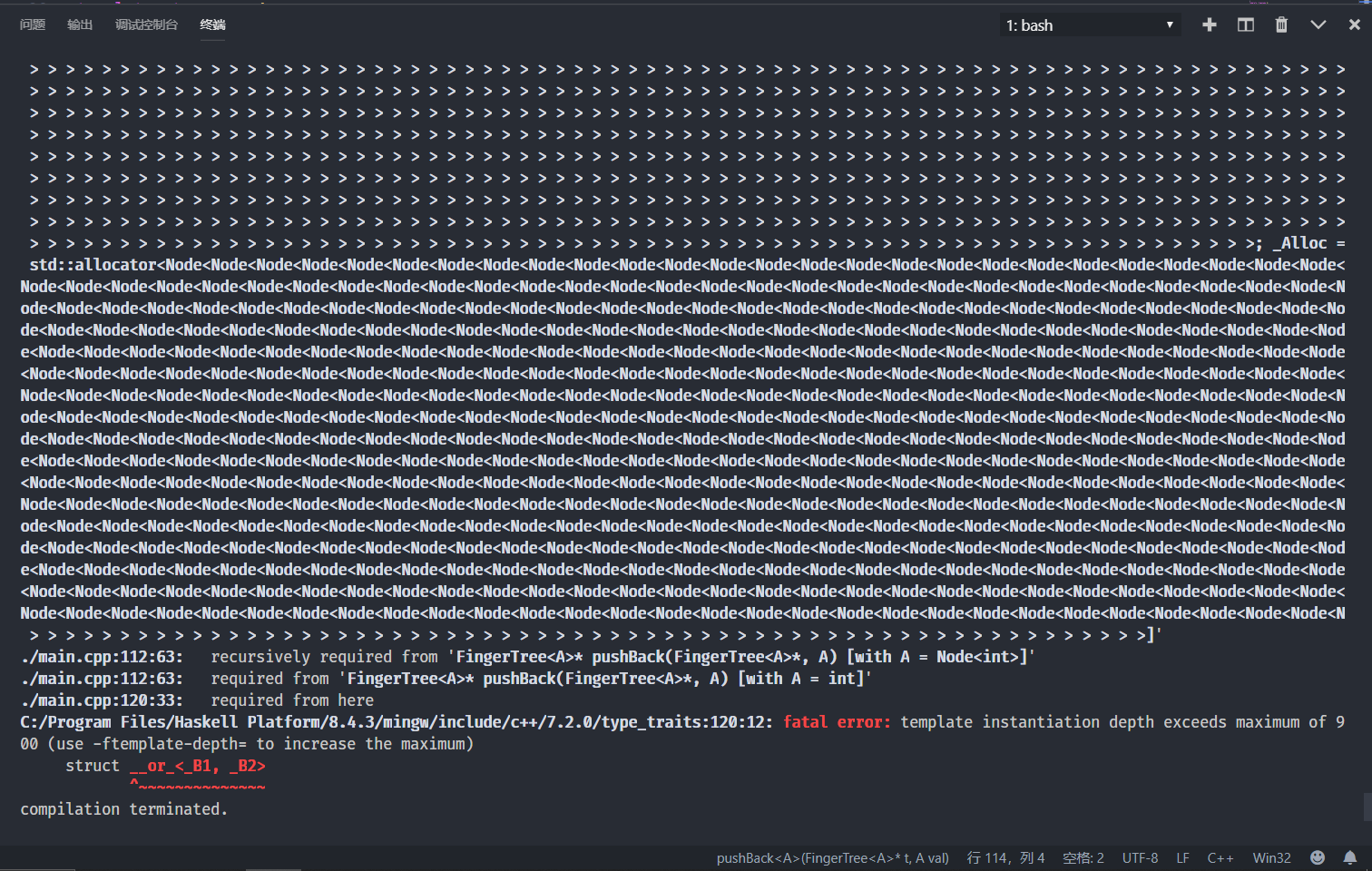将 Haskell 翻译为 C++
如何把 Haskell 代码翻译到 C++ 呢?记一次不成功的瞎搞经历。
多态函数
这个是比较好办的,用 C++ 的模板可以实现同样的操作,而 typeclass 可以直接忽略掉。
ADT
这个是重头戏了。考虑 Maybe
data Maybe a = Nothing | Just a
该怎么把它翻译成 C++ 呢?一种比较显然的思路是这样的:
enum MaybeType {
Nothing, Just
};
template <typename A>
struct Maybe {
MaybeType type;
A value;
};
看起来很不错,对吧!这样我们可以实现模式匹配:
template <typename A>
void foo (Maybe<A> v) {
if (v.type == Nothing)
return;
else
// do something
}
当然,也可以把 struct 换成 union,这样会省一点内存(Maybe 这个例子是不省的)。
然而,这样做会有一个很大的问题,考虑如下 Haskell 代码:
data Node a = Node2 a a | Node3 a a a
data FingerTree a
| Empty
| Single a
| Deep (Digit a) (FingerTree (Node a)) (Digit a)
type Digit a = Digit [a]
infixr 5 <|
(<|) ::a -> FingerTree a -> FingerTree a
a <| Empty = Single a
a <| Single b = Deep (Digit [a]) Empty (Digit [b])
a <| Deep (Digit [b, c, d, e]) m r = Deep (Digit [a, b]) (Node3 c d e <| m) r
a <| Deep (Digit xs) m r = Deep (Digit (a:xs)) m r
来自 FingerTree
注意到 FingerTree a 中 Deep 里的子树的类型竟然是 FingerTree (Node a),如此下去,嵌套层数会越来越多,变成 FingerTree (Node (Node a)) 之类的。这样,如果像刚才那样,在一个函数中判断 type 会导致编译器在实例化该模板时停不下来,直到达到限制。

那么应该怎么办呢?只需要使得不同 type 的 FingerTree 实例在不同的函数中被实例化就可以了。
我们可以写一个基类 FingerTree ,然后由它派生出 Empty,Single,Deep,这样以来,就可以利用函数重载,把它们分开了:
template<typename A>
Single<A> *pushFront(Empty<A> *t, A val) {
return new Single<A>(val);
}
template<typename A>
Deep<A> *pushFront(Single<A> *t, A val) {
return new Deep<A>(deque<A> {val}, new Empty<Node<A>>(), deque<A> {t->val});
}
template<typename A>
Deep<A> *pushFront(Deep<A> *t, A val) {
if (t->digit1.size() < 4) {
auto tmpdq = t->digit1;
tmpdq.push_front(val);
return new Deep<A>(tmpdq, t->subtree, t->digit2);
} else {
A b = t->digit1[0], c = t->digit1[1], d = t->digit1[2], e = t->digit1[3];
return new Deep<A>(deque<A> {val, b}, pushFront<Node<A>>(t->subtree, Node3<A>(c, d, e)), t->digit2);
}
}
FingerTree 的定义会在文章最末处给出。然而这样操作也会带来很多问题(这也是我弃坑的原因),考虑 Haskell 的表述:FingerTree 是类型名,而 Empty,Single,Deep 是值构造器(其实是函数)的名字。而这样操作,使得它们都是变成了类型,势必会带来一大堆锅。
enum NodeType {
node2, node3
};
template<typename A>
struct Node {
NodeType type;
};
template<typename A>
struct Node2 : public Node<A> {
A v1, v2;
Node2(const A &v1, const A &v2) : v1(v1), v2(v2) { this->type = node2; }
};
template<typename A>
struct Node3 : public Node<A> {
A v1, v2, v3;
Node3(const A &v1, const A &v2, const A &v3) : v1(v1), v2(v2), v3(v3) { this->type = node3; }
};
enum FingerTreeType {
Fempty, Fsingle, Fdeep
};
template<typename A>
struct FingerTree {
FingerTreeType type;
};
template<typename A>
struct Empty : public FingerTree<A> {
Empty() { this->type = Fempty; }
};
template<typename A>
struct Single : public FingerTree<A> {
A val;
Single(const A &val) { this->val = val, this->type = Fsingle; }
};
template<typename A>
struct Deep : public FingerTree<A> {
deque<A> digit1, digit2;
FingerTree<Node<A>> *subtree;
Deep(deque<A> digit1, FingerTree<Node<A>> *ptr, deque<A> digit2) {
this->digit1 = digit1;
this->digit2 = digit2;
this->subtree = ptr;
this->type = Fdeep;
}
};